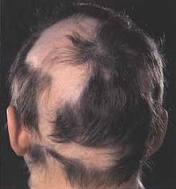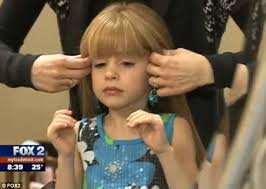Healthcare Professional
As a Health Care Professional you may be asked to provide treatment options. Please review some of our suggestions.
Frankie's Doctor - Dr. Ted Daly
Dr. Ted Daly has had a great interest in hair loss and alopecia areata (AA) for over 20 years, and offers varied and up-to-date treatments for hair loss and AA. He also treats all types of hair loss, and he has a great interest and expertise in common baldness as well as scarring and non-scarring hair loss.
At Garden City Dermatology, we offer all treatments for alopecia including immunotherapy diphencyprone (DCPC), squaric acid dibutyl ester (SADBE), DNCB, intralesional steroids, pulse steroids, aromatherapy, vitamin and mineral therapy, topical treatments including tars, steroids, anthralin, as well as other therapeutic modalities. Propecia, Rogaine (minoxidil) mixed with tretinoin (generic Retin-A), immunotherapy, PUVA (light therapy), blood testing, research protocols, ongoing studies as well as cutting edge information on AA and all other types of hair loss are also available.
Garden City Dermatology also uses Revage LASER for the treatment of hair loss and to produce hair regrowth and reducing excessive shedding of hair.
Dr. Daly is the Alopecia Areata Support Group Physician Consultant for Long Island and has been since 1988. He was the Alopecia Areata Support Group Physician Consultant for Colorado from 1984 - 1988.
Dr. Daly is frequently quoted in and requested to comment on current developments in hair loss and has been featured in multiple publications (NY Times, Newsday, Womens World, Natural Health, Prevention, Teen Magazine, as well as others) and has also been a guest on Good Day NY, The Fox Morning Show, CNN, News 12, ABC, NBC, Fox, CBS, as well as multiple cable channels.
Many dermatologists, both locally and nationally, continue to refer patients to Dr. Daly, and he frequently lectures on hair loss to both local and national audiences.
Many hair products are also sold through our office. For more information about Alopecia please visit . www.gardencityderm.com
Treatment for Alopecia Areata
In all forms of alopecia areata, the hair follicles remain alive and are ready to resume normal hair production whenever they receive the appropriate signal. In all cases, hair regrowth may occur even without treatment and even after many years.
There are no FDA approved treatments specifically for alopecia areata, alopecia areata totalis or alopecia areata universalis, however many medical professionals are willing to try treatments off label.
Mild, Patchy Alopecia Areata

There are treatment options available for mild, patchy alopecia areata (less than 50% scalp hair loss) though there is currently no acceptable treatment that works in all cases.
Cortisone injections:
The most common treatment is the injection of cortisone into the bare skin patches. The injections are usually given by a dermatologist who uses a tiny needle to give multiple injections into the skin in and around the bare patches. The injections are repeated once a month. Both the needle prick and the slight tingling are usually well tolerated and there is no discomfort after leaving the doctor’s office. If new hair growth occurs, it is usually visible within four weeks. Treatment, however, does not prevent new patches from developing. There are few side effects from local cortisone injections. Occasionally, temporary depressions in the skin result from the local injections, but these “dells” usually fill in by themselves.
Topical Minoxidil:
Five percent topical minoxidil solution applied twice daily may regrow hair in alopecia areata. Scalp, eyebrows, and bear may respond. If scalp hair regrows completely, treatment can be stopped. Two percent topical minoxidil solution alone is not effective in alopecia areata; response may improve if cortisone cream is applied thirty minutes after the monoxidil. Topical minoxidil is safe, easy to use, and does not lower blood pressure in persons with normal blood pressure. Topical minoxidil solution is not effective in treating those with 100% scalp hair loss.
Anthralin cream or ointment:
Another treatment is the application of anthralin cream or ointment. Anthralin is a synthetic, tar-like substance that has been used widely for psoriasis. Anthralin is applied to the bare patches once daily and washed off after a short time, usually thirty to sixty minutes later. If new hair growth occurs, it is seen in eight to twelve weeks. Anthralin can be irritating to the skin and can cause temporary, brownish discoloration f the treated skin. By using short treatment times, skin irritation and skin staining are reduced without decreasing effectiveness. Care must be taken not to get anthralin in the eyes. Hands must be washed after applying it.
Alopecia Areata Totalis and Alopecia Areata Universalis
Fewer treatment options are available for extensive alopecia areata (greater than 50% scalp hair loss).
Cortisone Pills:
Cortisone pills are sometimes given for extensive scalp hair loss. Cortisone taken internally is much stronger than local injections of cortisone into the skin. It is necessary to discuss possible side effects of cortisone pills with your physician. Healthy young adults often tolerate cortisone pills with few side effects. In general, however, cortisone pills are used in relatively few patients with alopecia areata due to health risks from prolonged use. Also, regrown hair is likely to fall out when the cortisone pills are stopped.
Topical Immunotherapy:
Another method of treating extensive alopecia areata or alopecia areata totalis/universalis is known as topical immunotherapy and it involves producing and allergic rash or allergic contact dermatitis. Chemicals such as diphencyprone (DPCP), dinitrochlorobenzene (DNCB), or squaric acid dibutyl ester (SADBE) are applied to the scalp to produce an allergic rash which resembles poison oak or ivy. Approximately 40% of patients treated with topical immunotherapy will regrow scalp hair after about six months of treatment. Those who do successfully regrow scalp hair still need to continue the treatment to maintain the hair regrowth, at least until the condition turns itself off. An itchy rash may be uncomfortable in very hot weather, especially under a wig. These treatments are not available everywhere in the United States although they are used frequently in Canada and Europe.
Wigs:

In general, treatments are much less effective for extensive alopecia areata (particularly alopecia totalis/universalis). For this reason, an attractive wig is an important option for some people. Proper attention will make a quality wig look completely natural; every wig has to be cut, thinned and styled, often several times. To keep a net base wig from falling off, even during active sports, special double sided tape can be purchased in beauty supply outlets and fastened to the inside of the wig. For those with completely bare heads, there are suction caps to which any wig can be attached and there are entire suction cap wig units. These state of the art wigs, which make use of a silicon base to create a secure vacuum-fit, are comfortable and easily removed by the wearer. Proper fit of a vacuum wig requires that any existing scalp hair be shaved. These wigs are generally more expensive than other types of wigs. |